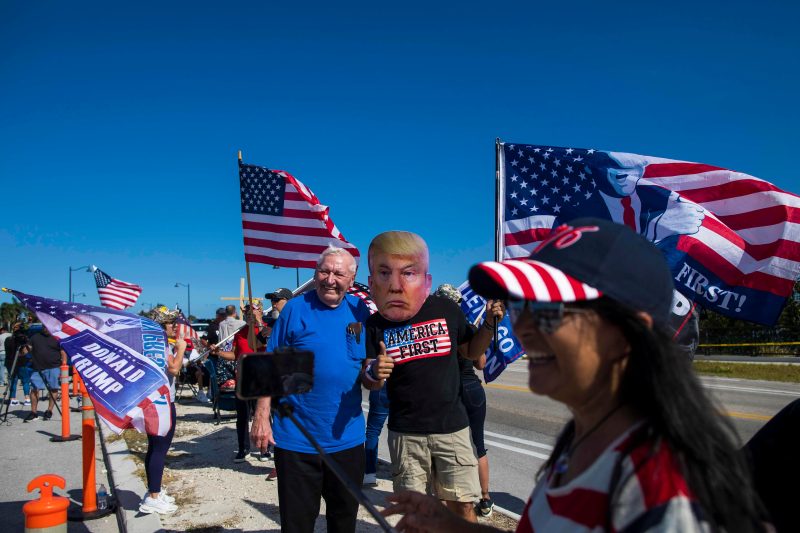It’s one of the more jarring charts you’re likely to see this week: A new poll released by the Wall Street Journal shows a precipitous decline in Americans’ views of certain values, including patriotism.
While 70 percent of Americans in 1998 said patriotism was “very important” to them, that number dropped to 60 percent in 2019 and to just 38 percent today — about half of where it was a quarter-century ago. We’ve also seen sharp drops on views about religion, having children and community involvement.
Fascinating long-term trends on what Americans value, per the latest WSJ-NORC poll: pic.twitter.com/BPqUElmohj
— Ben Pershing (@benpershing) March 27, 2023
A couple thoughts. One is that the chart is a little misleading, even as these values are rather evidently at a low point. And two is that the biggest drop — on patriotism — is clearly a byproduct of polarization. That’s for a host of reasons, including some that are especially relevant now as former president Donald Trump pitches the Jan. 6 insurrection as if it were an event to be proud of.
The Journal’s write-up features only polls from those three years — 1998, 2019 and 2023. But when the newspaper has highlighted this data in the past, it has mentioned another poll, asking the same question, in 1976 and 1977.
The results then? Not too far afield from today’s. At the time, just 43 percent said patriotism was “very important” to them.
The Vietnam War probably colored those numbers, as presumably did fallout from the Watergate scandal and the high inflation of the time. (For example, in 1976, Lt. William Calley Jr. was still appealing his highly publicized conviction in the Vietnam War’s My Lai Massacre; many Americans had soured on their government after the pardon of former president Richard M. Nixon in 1974; and people still remembered the severe gas shortages of the early-1970s, which had made it hard to fill the tanks of their quintessentially huge American cars.)
That history reinforces the idea that this dip isn’t simply a matter of Americans always having been quite patriotic until just now. It’s difficult to know for sure what people have in mind when they answer such a question — and these surveys don’t define or invite people to define patriotism for themselves — but the evidence suggests that answers tend to be responsive to real-world events. And the contrast between 1998 and today is likely more stark because the late-1990s were boom times; in fact, rarely have Americans been as happy with the state of affairs as they were back then.
But to the extent that there has been a decline in “patriotism,” that value, like so much else, has fallen victim to polarization.
The new Wall Street Journal poll shows 59 percent of Republicans saying that “patriotism” is very important to them, compared to just 23 percent of Democrats. You might notice more than a few conservatives highlighting that disparity.
It wasn’t always this way. The Pew Research Center has asked a similar question over the decades, querying people on whether they would describe themselves as “very patriotic.” And for many years, there was relatively little partisan difference. Democrats were generally about 10 to 15 points less likely to describe themselves that way, but it was nothing like the 36-point gap of today.
The gap began to yawn 20 years ago, with the start of the Iraq War. Even before the war’s launch, its GOP advocates began questioning the patriotism of Democratic critics. Soon, opposing the war was pitched as tantamount to opposing the troops, or at least not supporting them — with obvious parallels to the “love it or leave it” slogan of the Vietnam era. Democrats’ patriotic feelings initially stayed about the same, while the GOP’s increased even beyond post-9/11 levels. But soon we saw the patriotic feelings fall away on the left.
Gallup data shows patriotic feelings were somewhat steady after that, until we arrived at the biggest gap in recent history: the Trump years. Again, there was a rhetorical premium on patriotism on one side, while the other side grew disillusioned with the state of affairs.
The effect of that appears to linger. Trump is out of office, but views of patriotism continue to be colored by his four years. Trump’s nationalistic “America First” mantra took hold on his side of the aisle, but his vision alienated a clear majority of Americans.
Perhaps most tellingly, it’s not just Democrats who feel less patriotic; the numbers among independents have declined right alongside them and aren’t that much higher. That’s true across the Pew data, the Gallup data and the Wall Street Journal data. The latter shows just 29 percent of independents saying patriotism is “very important” to them, compared to 23 percent of Democrats.
It’s unlikely we’ll see everyone come together in patriotic unity anytime soon. That’s because Trump has begun more outwardly playing up the Jan. 6 riot as something akin to a patriotic act. There’s a receptive audience there, with a poll last year showing that nearly half of Republicans regarded the events at the Capitol that day as “patriotism” and 56 percent describing them as “defending freedom.” (Just 21 percent labeled it an insurrection.) Another poll showed 61 percent regarded it as a “legitimate protest,” with views clearly trending in a more positive light.
We’ve seen before how people can sour on the concept of patriotism when they intuit that it’s being wielded in a jingoistic manner. Throw on top of that the economic concerns and our growing lack of faith in institutions, and these numbers probably shouldn’t be too surprising.

